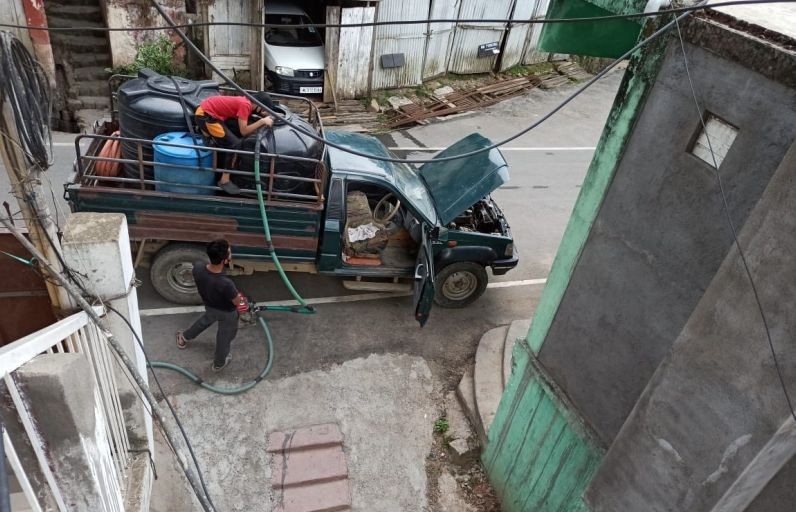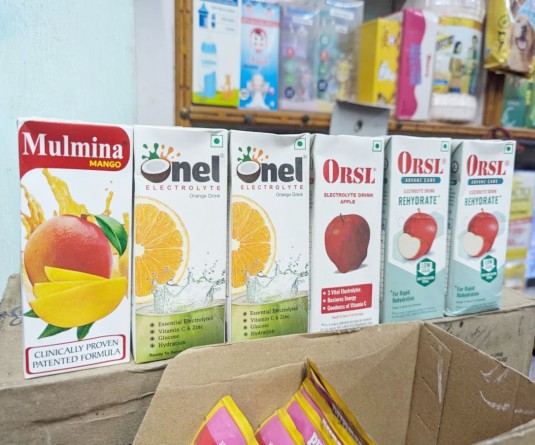A private water carrier is seen distributing water to customers at a colony in Kohima. (Morung File Photo)

Mid-term review of State’s Jal Jeevan Mission also calls for expediting retrofitting or augmentation of existing water supply systems
Morung Express News
Dimapur | November 9
Nagaland has been advised to give priority to test the quality of water and also allow public to test the same at state and district laboratories at ‘very nominal rate.’
The recommendations, among others, were made during a mid-term review meeting on planning and implementation of Jal Jeevan Mission (JJM) in Nagaland on October 23.
The JJM is a flagship program of Government of India to provide Functional Household Tap Connection (FHTC) to every rural household of the country by 2024.
Nagaland State officials also presented the progress to the National JJM team, an official release from the Ministry of Jal Shakti informed.
Under the mission, it was informed that 5 persons especially women are being trained in every village to use the Field Test Kits to test the quality of water.
“Every source needs to be tested once every year for physical and chemical parameters and twice for bacteriological contamination,” it said.
Accordingly, Nagaland Government was advised to give priority to these areas as well as complete the accreditation of State and district laboratories in the next 3-4 months, the release added.
The State was also urged to open those laboratories for public so that they can test the quality of water supplied at very nominal rate.
It must be noted here that the Public Health Engineering Department (PHED), Nagaland in the last week of September advised the public to get their water sources tested in their districts’ water testing laboratories or the State Laboratory in Dimapur.
A press release from Er N Thsathirichem Sangtam, Chief Engineer, Sanitation and WSSO, PHED then informed that district water testing laboratories have been established in all the districts along with the State Laboratory to carry out physical, chemical and bacteriological analysis of water sources.
The department encouraged people to get their water sources tested in these laboratories for a nominal fee.
It is not known how many have tested so far or whether such data was presented at the review meeting.
State’s Piped Water Supply systems
Meanwhile, as per the review meeting, 1,351 villages out of 1,502 in Nagaland have Piped Water Supply (PWS) systems, through which 3 lakh tap water connections can be provided.
The retrofitting and augmentation of such schemes will ensure the annual target of 1.47 lakh FHTCs in the State, it noted.
The Ministry’s release also informed that in the only aspirational district, Kiphire, 83 villages (75%) out of 111 villages have PWS.
Further, out of 15,845 households in the district, 13,478 (85%) households have access to PWS and the remaining households will be provided tap connections.
Stressing on the need for proper planning to be done to achieve the goal of the mission within the timeframe with focus on retrofitting/ augmentation of existing water supply systems to provide tap water connections to remaining households, the senior officials advised the State Government officials to expedite the implementation, it said.
The officials also called for focusing on the planning to be done at village level and preparing Village Action Plan (VAP) of every village by dovetailing all available resources by convergence of different programmes viz. MGNREGS, SBM, 15 Finance Commission Grants to PRIs, CAMPA funds, Local Area Development Funds, etc, it added.
The State Government was also asked to involve the local village community, Gram Panchayats and user groups in planning, implementation, management, operation and maintenance of water supply systems in villages to ensure long-term sustainability to achieve drinking water security.
It was also urged to start formation, education, and communication (IEC) campaign along with community mobilisation in all villages.
The State was requested to ensure all the anganwadi centres and schools are provided piped water supply as part of the special 100-day campaign so that potable water is available in these institutions, the release added.




